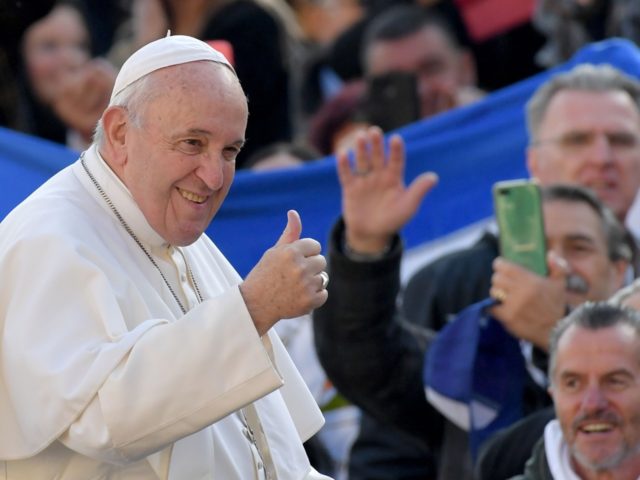Budapest, HUNGARY — Pope Francis said Tuesday that not only nuclear weapons but also nuclear power plants should be at least temporarily banned because of their destructive capability.
During the press conference aboard the papal plane returning from Thailand and Japan Tuesday, the pope reiterated his belief that not only the use, but also the possession of nuclear weapons is evil, since “due to an accident or the madness of some government leader, a person’s madness can destroy humanity.”
Yet the pontiff also went on to comment on the morality of nuclear energy as well when asked by a journalist whether Japan should shut down its nuclear power stations.
“Regarding the possession of nuclear power plants, an accident can always occur,” Francis said. “Nuclear energy has limits… The use of nuclear energy has limits because we have not yet achieved absolute security.”
“You could tell me that even electricity could cause a disaster due to a lack of security, but it would be a very small disaster,” he continued. “A disaster at a nuclear power plant would be a major disaster. Security systems have not yet been resolved.”
The pope then went on to express his prudential judgment that nuclear power should be put on hold until it is “completely safe.”
“It’s my personal opinion, but I wouldn’t use nuclear power until it’s completely safe,” he said. “Some say that it is a risk to the care of creation and that the use of nuclear energy must be banned. I’m drawing the line at security.”
“There is no guarantee of guaranteeing that a disaster will not occur,” he said. “Yes, once every ten years in the world. Then there’s creation. The disaster that nuclear power causes to creation, to the human person.”
The pope cited the nuclear disaster at Chernobyl in 1986 as an example of what can happen when nuclear power is not well contained.
“We need to conduct safety research, to avoid both disasters and environmental consequences,” he said. “I think we have breached the limit with regard to the environment: with pesticides in agriculture, with the rearing of chickens that doctors tell mothers not to feed their children because they give them hormones and are harmful to their health.”
“There are so many rare diseases today due to the misuse of the environment,” he said. “Either the care of the environment takes place today or it never will.”
Renowned Australian economist Judith Sloan has argued that nuclear energy is among the cheapest and “greenest” energy sources currently available, and yet it does not get the attention it deserves.
During the Obama years from 2010 through 2013, U.S. federal subsidies for fossil fuels decreased by 15 percent, from $4.0 billion to $3.4 billion, and subsidies for nuclear energy fell by 12 percent, from $1.9 billion to $1.7 billion, Sloan has noted.
While during the period between 2010 and 2014 nuclear energy cost about 4¢ and 5¢ per kWh to produce, solar energy cost so 20 times as much to produce, between 80¢ and 100¢ per kWh.
This despite the fact that nuclear energy is “as renewable as wind” but doesn’t enjoy the same star status among environmental activists, Sloan contends.

COMMENTS
Please let us know if you're having issues with commenting.